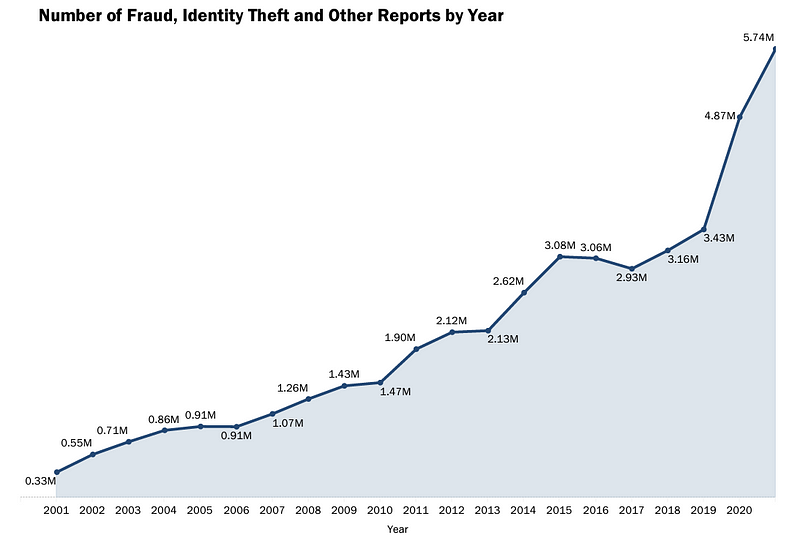Would You Consider Becoming a Criminal?

Greetings friends!
To be clear, I assume all of YOU reading this are saintly and would never so much as jaywalk.
But did you ever wonder just how many other people do commit crimes for money? And do so regularly as their principal business? I wondered. As a result, today’s question is this:
Who’s out to defraud us, and how many of them are among us right now?
The criminal economy is huge, and growing quicker than almost any other market segment. Total crime in the U.S. represents some five trillion dollars of economic activity or 20% of our total economy.
Today I’ll drill down on a small subset of crimes, fraud. That’s because fraud disproportionately hits people who work remotely, who work for themselves, and those who are retired. Many of you, dear readers.
How Many People Commit Fraud?
Statistics on how many of us decide to commit fraud are hard to come by. It’s tough finding accurate crime statistics and the figures you do find are incomplete because many crimes go unreported.
Start with how many people regularly lie
As a proxy to peek behind the curtain, let’s first consider how often people lie. A recent study took a careful look at this.
- The researchers determined that about 75% of us are largely honest, telling from no lies to a maximum of two lies per day. Angels, really.
- Most of the rest (about 20%) tell between three and five lies a day.
- And small percentage (5.7%) are prolific liars, of whom just 1% account for most lies told. Could you tell 200 lies a day? I’m disgusted, but also reluctantly impressed.
From this, we can predict that at least 75% of the population would not commit fraud. After all, if you don’t even tell lies in daily life you’re hardly likely to undertake any criminal activity.
What kind of liar would commit fraud?
And lying as such is a far cry from committing fraud. I suspect the percentage of people who commit fraud is much less even than the 5.7% of prolific liars.
Let’s charitably assume therefore that our pool of potential fraudsters consists of no more than the 1% of people who account for most lies.
Because we want to believe the best about humanity, let’s further estimate that only 1 in 10 of the potential pool of 1% crosses over to criminal activity. This leaves us with a figure of just 0.1% of the population as likely fraudsters.
Time for a gut check. Is 0.1% too low a figure for our estimate of persons who might commit fraud?
What can we learn from figures for all criminals, all frauds, and prolific criminals?
In the U.S. about 1.7% of the population is counted in the “total correctional population,” meaning prison, parole, and probation. Source: Bureau of Justice Statistics. Although this covers all offenses, would a person who commits more serious crimes balk at fraud?
Let’s look at the number of reported frauds to help us triangulate. According to the Federal Trade Commission, which oversees fraud reports, there were 5.74 million reports in 2021, including fraud, identity theft, and other reports.

Many frauds go unreported. We can safely assume the total number is twice as high as what the FTC hears about, so say 10 million frauds per year. How many criminals would it take to generate that many incidents of fraud?
It turns out that, just like liars, career criminals are quite prolific. The New York City Police Department reported recently that a mere 327 individuals were responsible for 30% of New York’s 22,000 shoplifting arrests last year.
Just take a moment and let that sink in. Amazing, right?
Doing the math, we calculate that each of these shoplifting scourges was arrested about 20 times. (Likely they shoplifted more times than they were caught or arrested.)
Let’s assume our fraudsters are more prolific than New York’s worst shoplifters, attempting 30 frauds a year.
- It would take just 333,000 fraudsters to account for our estimated 10 million annual frauds.
- That represents 0.1% of the total U.S. population.
I thus estimate the number of dedicated criminals who regularly commit fraud is around 0.1% of the population.
What’s Tiny in Other Contexts is Genuinely Scary Online
While 0.1% looks like a tiny number, it’s shocking to think about what even that represents. Most sites have millions of regular users. This means tens of thousands of fraudsters.
Not only that, but because it’s their full-time job, they are pushing their scams on a regular basis. If 10,000 fraudsters attempt 30 scams a year, we’re suddenly confronted with 300,000 interactions whose sole purpose is to part you with your money.
My BS detector goes off all the time online, and now I know why. It’s not just the clickbait headlines. It’s people who are actively trying to steal our money.
My Advice — Be On the Lookout
I spoke with a smart friend about this topic, and his reaction was “You’re too low by at least a factor of ten, James.” I hate to think about what that would mean.
Whether 0.1% or 1%, it’s clear that we have every reason to be careful.
Are there some simple steps we can take to protect ourselves? Short answer, yes.
The Federal Trade Commission has many tips on how to identify and avoid scams. They also talk about identity theft, job scams, credit and debt scams, and more.

If you are not already a little paranoid, I recommend you browse some of their helpful tips.
I’ll end with my favorite advice from the FTC, which serves as an excellent rule of thumb for classifying all offers we see:
“If someone … claims you can make a lot of money in a short period of time and with little work, that’s a scam.” — Federal Trade Comisssion
Be well.
PS — What do you think? Are there more scammers among us than I want to believe? Have you ever been scammed? The comment section is calling you…
Hit reply to tell me what's on your mind or write a comment directly on Klugne. If you received this mail from a friend and would like to subscribe to my free weekly newsletter, click here.
I posted a version of this article on Medium originally.






Member discussion